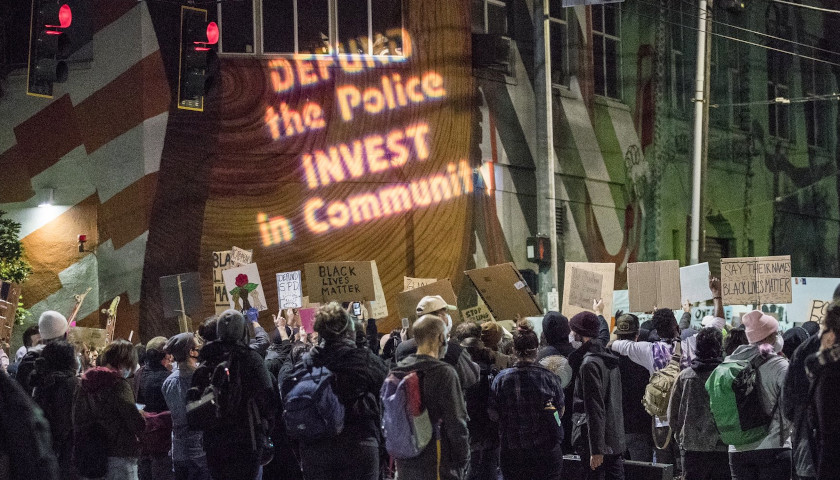by Robert Romano
The cultural revolutionaries who have begun marching in the wake of the murder of George Floyd by former Minneapolis police officer Derek Chauvin have opened a widespread assault on history itself, toppling statues across the country including those of Confederate generals like Albert Pike in Washington, D.C. but also Union generals, too, like Ulysses S. Grant in San Francisco, who won the Civil War to abolish slavery and later went on to become President.
The vandals have even begun targeting religious symbols, with some calls to go after statues of Jesus, who was Jewish, as somehow being a symbol of white supremacy.
Quickly, a protest that began as a push to address police brutality has devolved into a violent radical movement seeking to supplant American culture itself.
The breakaway democratic republic of the Capitol Hill Autonomous Zone (CHAZ) in downtown Seattle had its first shooting as the occupation enters its third week after the city abandoned a police precinct, with one dead and another in critical condition. Now Democratic Seattle Mayor Jenny Durkan is calling for police to return to the area and reclaim the precinct to be able to respond to emergency calls.
Durkan says it can be done “peacefully,” and surely let us hope so. Some see this in merely a political context, but the violent revolutionary ideology being pursued here if allowed to flourish will not stop at elections or toppling statues. They want our very minds.
If you disagree with them, you’re not a free-minded individual, no, you’re a fascist. A racist. A Nazi.
In that sense, they are not much different from the outlook of Joseph Stalin, whose career of murder 9 million of his perceived enemies gives a peek into what can happen if violent revolution is allowed to be waged against a country unchecked — and just how long it can take to recover from those crimes.
Stalin’s reign is surely the worst case scenario. Could such a thing happen here? The only way to find out is to grant the revolutionaries power. It is certainly hard to imagine how such a thing could happen today from the comfort of our homes, jobs and houses of worship today. It all depends on if anything is done as the radicals seize power. At a certain point, it becomes too late, and the error cannot be seen but in hindsight.
The civil society today and the rule of law and courts can hold officers like Chauvin to account. The mob can destroy that system of justice, as imperfect as it is. And how bad it gets depends on what if anything society does to stop it.
Is such a revolution taking place today?
In 1956, three years following the death of Stalin, Nikita Khrushchev in a secret speech to Communist Party officials described the horrific crimes that had been committed by Joseph Stalin during the purges and mass internment when millions perished: “Stalin acted not through persuasion, explanation, and patient cooperation with people, but by imposing his concepts and demanding absolute submission to his opinion. Whoever opposed this concept or tried to prove his viewpoint, and the correctness of his position was doomed to removal from the leading collective and to subsequent moral and physical annihilation.”
Khrushchev would go on to describe the brutality of the purges and “fabricated court cases” against those who had committed no crimes. This was a program for mass imprisonment of 18 million in the gulag system based on mere thought crimes or imagined crimes in the gulags.
The Khrushchev speech would not be officially released until 1989 by Mikhail Gorbachev during the program of glasnost but its impact at the time was major. True, Khrushchev’s criticism was still couched in the context of preserving ideological purity of the state. It’s just that Stalin took it way too far and was even killing loyal communists and innocent bystanders, from the perspective of the Party. His words were weak by the standards of a civil society and yet were still revolutionary within the one-party system, representing perhaps its first significant crack.
But the Soviets were not necessarily in a hurry to release all the prisoners. Although the gulag system began being dismantled as early as 1954, first cases were reviewed in a long process. My wife’s aunt who was born and grew up in a gulag in Siberia would not be liberated until 1958, even then the ordeal was not over. First, they were not allowed to immediately return to their home country of Moldova without a proper passport and propiska. And even when individuals could get home — bribes helped — upon returning to society, former gulag prisoners, many of whom had committed no crime, were discriminated against for employment and other matters, a relic of the Stalinist era.
Once imprisoned, they never stopped being enemies of the state.
Still, the forced labor and internment camps would persist for political prisoners even as millions were being let out of the camps. It would not be for a full 34 years after Stalin’s death, and 63 years after he had first assumed power in 1924, that the last gulag at Perm-36 in Kuchino would be closed in 1987 under Gorbachev.
Stalin’s acts were never nullified in his lifetime. That would not come about until after his reign of terror was over, and even then it took several years. Would it take despotism on that level to remind Americans of what they might really be up against with the current rebellion? Do we want to wait around to find out?
Or, perhaps, are enough Americans finally ready to embrace violent revolutionary ideology today by looking the other way?
– – –
Robert Romano is the Vice President of Public Policy at Americans for Limited Government.
Photo “Defund the Police-Black Lives Matter Supporters” by Backbone Campaign. CC BY 2.0.




